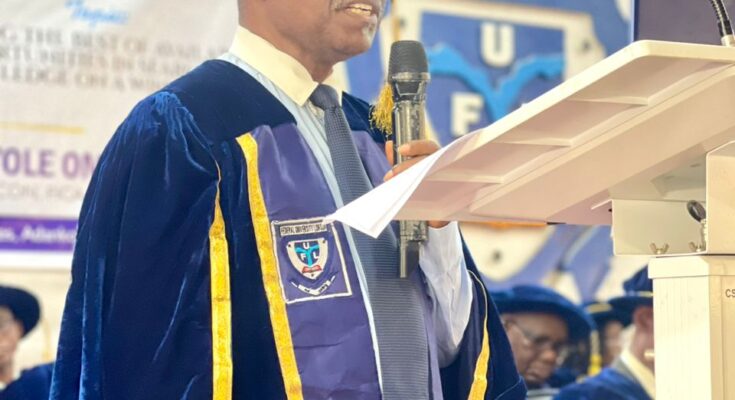* As FUL holds 20th Inaugural lectures.
ATABOR JULIUS LOKOJA
Against the backdrop of public ill feelings about the high rates of first class degrees shun out by Nigerian Universities, especially private Universities, Professor kolawole David Omole has canvassed for a uniform process for awarding degrees by both private , states and Federal Universities
The Erudite Professor noted that the call has become imperative to monitor the process by which Universities used in awarding their certificates, adding that private Universities were allegedly noted for shunning out first class degrees above states and federal Universities.
This is just as he advised National policy makers to strengthen the post Utme screening to ensure that the best admission applicants are admitted, stressing that studies have shown that those with high post Utme results often come out with higher grades.
Kolawole David Omole , a graduate of Biochemistry and professor of Science Education, gave the charge in his Inaugural lecture, title ” Making Best of available opportunities in search of knowledge on a windy path, held Wednesday 17, 2024.
The lecture which is the 20th in the series , the professor posited that for the certificates from Nigeria tertiary institutions to have worth and global recognition, teachers and lecturers and university administrators need to maintain high integrity of their examinations.
He urged the university authorities to strive to improve the integrity of its examinations, which will eliminate doubts and misgivings about the quality of degrees produced by the Universities.
He said the private universities produced the highest percentage of students’ turn over with better class of degrees than those from Federal and state universities, stressing that there is need for efficient and effective monitoring and evaluation process to maintain uniformity in the quality of instruction and certification across all university categories in Nigeria.
He stated that this was revealed through a study which used an ex-post facto research design.
Sample and Sampling:- Representative universities were selected using multistage sampling technique to produce a total of twenty-two (22) made up of 12 federal, 8 state and 2 private universities from which a total of 4898 students’ records having complete information was found useful for the study.
“A proforma was designed and used for data collection. This took into consideration, the general university information and students’ academic and personal data.
According to him” Public examinations poorly predicted university achievement suggests that they may not be good indices for determining or selecting those who are likely to succeed in university education.
The four public examination bodies employed achievement tests. This may be considered adequate for certificate examinations being conducted by WAEC, NECO or NABTEB but for JAMB that was designed as a selection examination to employ achievement test is technically flawed. For selection purposes, aptitude tests are preferred to achievement test.
“To this end, there is need for a paradigm shift from achievement test to aptitude test for UME”
While acknowledging the importance of tests and examinations in assessing the quality and quantity of knowledge dissemination and assimilation in the course of instruction which has its challenges,, urged National Policy makers to continue to search for other methods that will ultimately delivery the best to the nation.
He added that it has been established that there is ‘No one single jacket fit all’ method in the assessment and evaluation of instruction and programme in education, advising for methods in which the assessment result is to be put should be the best determinant of the method and principle to be employed in the process.
He , however, solicited for a paradigm shift in the notion of “Assessment OF learning” to reflect “Assessment FOR learning”
In a remark, the Vice Chancellor, Professor Olayemi Akinwumi commended the bold step of the lecturer for his contribution to the field which have garnered recognition both nationally and internationally.
He equally commended him for his endeavour in research, teaching, and mentorship which has not only advanced the discipline but also enriched the academic experiences of countless students and colleagues.
He said the topic of today’s lecture highlights a truth that is all too familiar in the academic world – the path to knowledge is rarely straightforward.
“It is filled with unexpected turns, challenges, and opportunities. Professor Omole’s ability to seize these opportunities, despite the obstacles, is a testament to his resilience and vision, the lecture is undoubtedly provide us with valuable insights into how we can all make the best of the opportunities that come our way, even when the path is not always clear.




